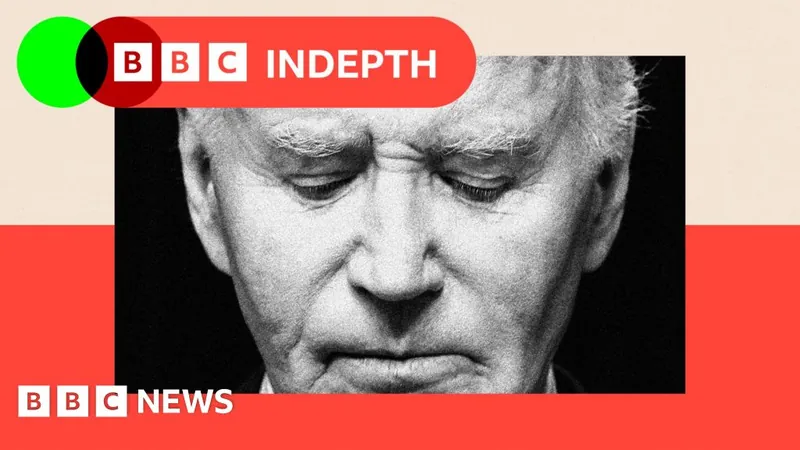
Biden's Regime: The Unraveling Strategy of a Once-Mighty Presidency
2025-01-13
Author: Jacob
In a poignant moment last week, President Joe Biden stood at the National Cathedral in Washington, delivering a eulogy for former President Jimmy Carter, surrounded by other past presidents, including Bill Clinton, George W. Bush, Barack Obama, and even Donald Trump. The presence of these figures highlighted a stark truth: unlike his predecessors, Biden is preparing to exit the White House without a second term, having only served one.
Biden lauded Carter, referencing his remarkable foresight on various issues, including civil rights and nuclear non-proliferation. However, as he stood there reflecting on Carter’s enduring legacy, Biden himself is facing a historical judgment of his own tenure—one that remains clouded by low approval ratings and challenges both domestic and abroad.
As he ends his presidency next week, Biden's approval rating has plummeted to around 39%, a stark drop from 57% at the beginning of his term. The emergent narrative categorizes Biden as a temporary figure—a mere interlude between two Trump presidencies—raising questions about the achievements and failures that have defined his time in office.
Throughout his presidency, Biden championed key legislation—including infrastructure investments and healthcare reforms—boasting the appointment of a diverse array of judges. Yet, the memory of his administration seems overshadowed by unrelenting crises, including inflation and immigration challenges, many of which were predictable yet managed poorly.
Biden’s inaugural blunders began with a catastrophic withdrawal from Afghanistan in August 2021. The ensuing chaos and the panicked fall of Kabul marked a moment of considerable fallout; public support for Biden began to crumble, and his approval ratings never rebounded thereafter. Domestically, the administration's dismissal of rising inflation added fuel to fire. Initially dubbed "transitory," inflation peaked at 9.1% in June 2022, while Biden maintained his optimistic outlook—a miscalculation that voters would not forget.
In a series of missteps, the Biden administration struggled to effectively address the surge in undocumented immigration, supply chain disruptions, and rising costs of basic necessities. The fallout from healthcare issues—including a spike in infant formula prices—and the end of Roe v. Wade only compounded these troubles, making it increasingly difficult for the administration to maintain a cohesive and effective message.
Amid the turmoil, reports emerged suggesting Biden’s administration was plagued with infighting and frustration. As the initial decisiveness of his team faded, a more insular inner circle emerged, causing divisions and distractions within the party. Under mounting pressure, the ongoing investigations into Biden’s handling of various issues culminated in an impeachment inquiry in September 2023, further complicating his already shaky political standing.
As Biden announced his re-election campaign in April 2023, he framed it as a battle against the forces of extremism, particularly the return of Trump. Yet, Americans remained unconvinced, feeling a disconnection between Biden’s proclamations of economic success under “Bidenomics” and the ongoing challenges they faced at home.
His legacy continued to erode as Biden confronted multifaceted crises—such as the aftermath of the Hamas attack on Israel, the elephant in the room being his son Hunter's escalating legal issues. The juxtaposition of personal pain and public duty weighed heavily upon him, contributing to a narrative of vulnerability just as he entered a crucial re-election debate with Trump.
In a harrowing performance during the debate, Biden's confusion and perceived ineffectiveness crystallized the doubts held by many, resulting in a tragic conclusion: he opted to withdraw from the race just months before the election. Trump ultimately reclaimed power after defeating Kamala Harris, Biden's chosen successor.
The lingering question remains—what could have been had Biden decided to step aside gracefully? The idea of a Democratic primacy, led by a fresh face, could have potentially reinvigorated the party’s standing and allowed Biden to exit the political stage with dignity.
Reflecting on his presidency, it’s evident that the intersection of age, miscommunication, and an ever-complying media landscape set the stage for a rapid downfall. The final verdict on Biden’s legacy will rest in the hands of history—as Trump returns to the White House, eager to dismantle the progressive achievements of the past four years, it remains to be seen how Biden's initial vision will ultimately be remembered.
Biden’s tenure emphasized the importance of adaptability in leadership, a lesson that elected officials across the board could learn from as the political landscape continues to shift. In the end, Biden’s administration serves as a cautionary tale about the challenges of navigating complex expectations amidst unprecedented crises—leaving a legacy that, while marked by significant policy achievements, is ultimately overshadowed by a turbulent political climate and his inability to connect with the American people.



 Brasil (PT)
Brasil (PT)
 Canada (EN)
Canada (EN)
 Chile (ES)
Chile (ES)
 Česko (CS)
Česko (CS)
 대한민국 (KO)
대한민국 (KO)
 España (ES)
España (ES)
 France (FR)
France (FR)
 Hong Kong (EN)
Hong Kong (EN)
 Italia (IT)
Italia (IT)
 日本 (JA)
日本 (JA)
 Magyarország (HU)
Magyarország (HU)
 Norge (NO)
Norge (NO)
 Polska (PL)
Polska (PL)
 Schweiz (DE)
Schweiz (DE)
 Singapore (EN)
Singapore (EN)
 Sverige (SV)
Sverige (SV)
 Suomi (FI)
Suomi (FI)
 Türkiye (TR)
Türkiye (TR)
 الإمارات العربية المتحدة (AR)
الإمارات العربية المتحدة (AR)